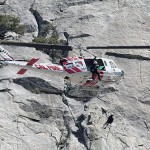Fern Valley Water District will consider whether to declare a water emergency at its June meeting.
“The staff has determined that a threatened water shortage exists,” General Manager Steve Erler told the board last week.
Erler stressed that “… everything looks satisfactory and there has been no significant drop in well levels.” While water production from wells was 3.5 percent more than March 2013, it was only 12.7 percent of total water sources. However, he is becoming more concerned about the future water supply.
Low rainfall and barely any snow pack at higher elevations have Erler worried about nature’s ability to provide adequate water for diversions or to recharge groundwater.
“There could be insufficient water forthcoming for anticipated customer demand and firefighting protection,” he said. He recommended the board hold a public hearing at its June 20 meeting on whether to establish the water emergency and President Robert Krieger agreed to place the topic on the agenda.
In other business, the board discussed whether to use a consultant or conduct studies themselves in order to recommend raising water rates this year. The last rate hike was approved was in June 2009.
The Rate and Revenue Committee had met with Sam Gershon, senior vice president of Albert A. Webb Associates, an engineering firm, who presented a proposal to conduct the studies needed for FVWD to propose a water rate increase this year.
“Unfortunately, it had a $20,000 price tag,” said Committee Chair and Director Ron Korman. He and committee colleague Trisha Clark felt the expenditure was not appropriate because district staff could do the work.
Krieger and Korman discussed what Webb and Associates would prepare and whether the district staff had the time and ability to prepare similar reports and studies necessary for a Proposition 218 (rate increase) hearing.
“If we take a fiscally responsible approach, [an increase] should be a non-issue,” Korman stated. “… the facts are clear we need a rate increase.”
Through March, FVWD expenses exceeded revenues by nearly $500,000. But only 70 percent of the fiscal year revenue had been received — more property tax revenue and water revenue will be collected before July 1. Also, nearly two-thirds of the expenses were for capital projects for pipeline replacement.
Operating expenses of $411,000 were $70,000 less than water sales revenue received. However, the budget estimates that operational costs will exceed sales revenue by $60,000 for the full fiscal year.
But Krieger wanted to be sure the analyses were sufficiently detailed to explain the proposed increases for classes of customers. Both agreed that capital improvement plans and projected future costs would be necessary to justify any increase.
A specific proposal on the approach for analyzing the need and the level of increase will be on the agenda of the district’s June meeting, both men agreed.










